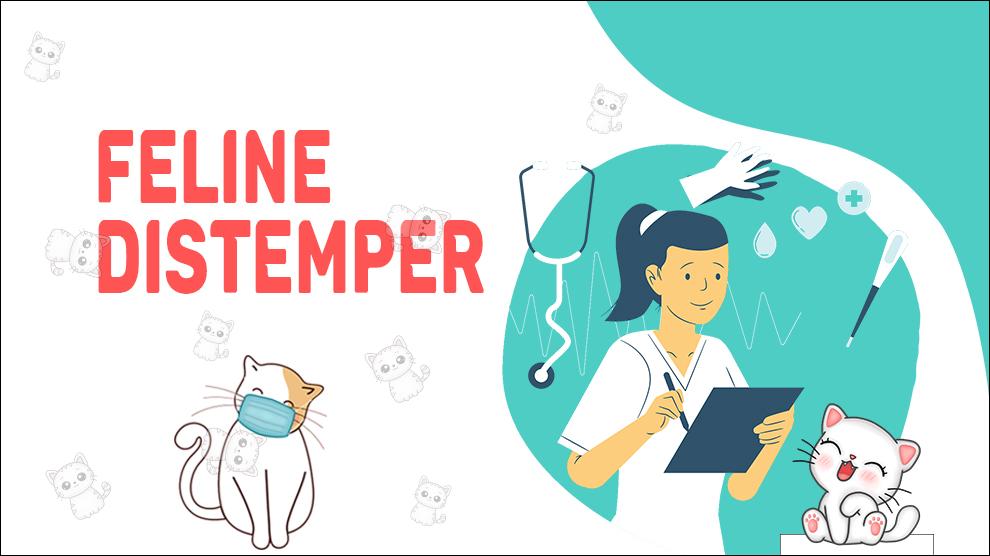What Is Feline Distemper?
Feline distemper, also known as feline panleukopenia, is a highly contagious viral disease that affects cats.
It is caused by the feline parvovirus, which attacks the cells of the digestive system, bone marrow, and lymphoid tissues.
The disease is most common in kittens and young cats, but it can affect cats of any age.
Feline distemper can be a serious and sometimes fatal condition, so early detection and treatment are essential.
Symptoms Of Feline Distemper
The symptoms of feline distemper can vary depending on the severity of the infection, the age and overall health of the cat, and the strain of the virus.
The most common symptoms include:
- Lethargy and weakness
- Loss of appetite
- Vomiting and diarrhea
- High fever
- Dehydration
- Tremors and seizures
- Anemia
- Weight loss
- Depression
- Death
- Abdominal Pain
- Collapse
- Skin Bruises
- Sneezing
- Nasal Discharge
- Mucus Discharge In Eyes
- Hiding
- Fatigue
- Lack Of Coordination
- Difficulty Walking
- Black Stool
Treatment Options For Feline Distemper
There is no cure for feline distemper, so treatment focuses on relieving symptoms and preventing complications.
Treatment may include:
- Fluid therapy to prevent dehydration and maintain electrolyte balance
- Antibiotics to prevent or treat secondary bacterial infections
- Anti-vomiting medications
- Pain medications
- Nutritional support, including syringe-feeding or feeding tubes
- Isolation to prevent the spread of the virus to other cats
- Supportive care such as heating pads or blankets to help maintain body temperature
- Blood transfusions in severe cases
Home Remedies For Feline Distemper
While there is no cure for feline distemper, there are some home remedies that cat owners can use to help manage the symptoms and support their cat's recovery.
It is important to note that these remedies are not a substitute for veterinary care, and any cat with suspected feline distemper should be seen by a veterinarian immediately.
- Provide supportive care: One of the most important things cat owners can do to help their cat recover from feline distemper is to provide supportive care. This may include keeping the cat hydrated with electrolyte solutions, providing soft and easily digestible foods, and keeping the cat warm and comfortable.
- Boost the immune system: A strong immune system can help fight off the feline parvovirus and support the cat's recovery. Cat owners can help boost their cat's immune system by providing a healthy and balanced diet, ensuring their cat gets enough rest, and minimizing stress.
- Natural remedies: Some natural remedies may help alleviate the symptoms of feline distemper. These may include giving the cat probiotics to support gut health, using herbal remedies like chamomile or peppermint to soothe upset stomachs, or using homeopathic remedies like Arsenicum album or nux vomica to support the immune system.
- Cleaning and disinfecting: Feline distemper is highly contagious, so it is important to clean and disinfect the cat's environment to prevent the spread of the virus. Cat owners should use a bleach solution to clean all surfaces, toys, and bedding, and keep the cat isolated from other cats until they have fully recovered.
How To Prevent Feline Distemper?
The best way to prevent Feline Distemper is by vaccinating your cat.
Vaccines for Feline Distemper are part of the core vaccinations recommended by the American Association of Feline Practitioners.
Kittens should receive their first vaccine at 6-8 weeks of age, with boosters given every 3-4 weeks until they are 16 weeks old.
Adult cats should receive a booster vaccine every one to three years, depending on their risk of exposure.
To prevent the spread of Feline Distemper in multi-cat households, new cats should be quarantined and tested for the virus before being introduced to other cats.
litter boxes, food, water bowls, and bedding should be kept clean and disinfected regularly.
Affected Cat Breeds Of Feline Distemper
Feline Distemper can affect cats of all breeds and ages, but young cats are most at risk. Kittens between the ages of 2 and 6 months are particularly susceptible to the virus.
Causes For Feline Distemper
Causes:
Feline distemper is caused by the feline parvovirus, a highly contagious virus that is spread through contact with infected animals, feces, urine, or contaminated objects such as food bowls, litter boxes, and clothing.
The virus can survive for long periods in the environment and is resistant to many disinfectants.
Once a cat is infected, the virus attacks rapidly dividing cells in the body, including those in the bone marrow, intestinal lining, and nervous system.
When To See A Vet For Feline Distemper?
If you suspect that your cat may have Feline Distemper, it's important to seek veterinary care immediately.
The virus can progress rapidly, and early intervention is essential to improving your cat's chances of survival.
Contact your veterinarian if you notice any of the symptoms listed above.
Food Suggestions For Feline Distemper
There are no specific dietary recommendations for cats with Feline Distemper, but it's important to ensure that your cat is eating and drinking enough to stay hydrated and maintain their strength.
If your cat is experiencing vomiting or diarrhea, a veterinarian may recommend a bland diet of boiled chicken and rice or a prescription gastrointestinal diet.
Conclusion
Feline Distemper is a serious viral disease that can be fatal if left untreated.
Fortunately, the virus is preventable through vaccination and good hygiene practices.
If you suspect that your cat may have Feline Distemper, seek veterinary care immediately. With prompt and appropriate treatment, many cats are able to make a full recovery.











